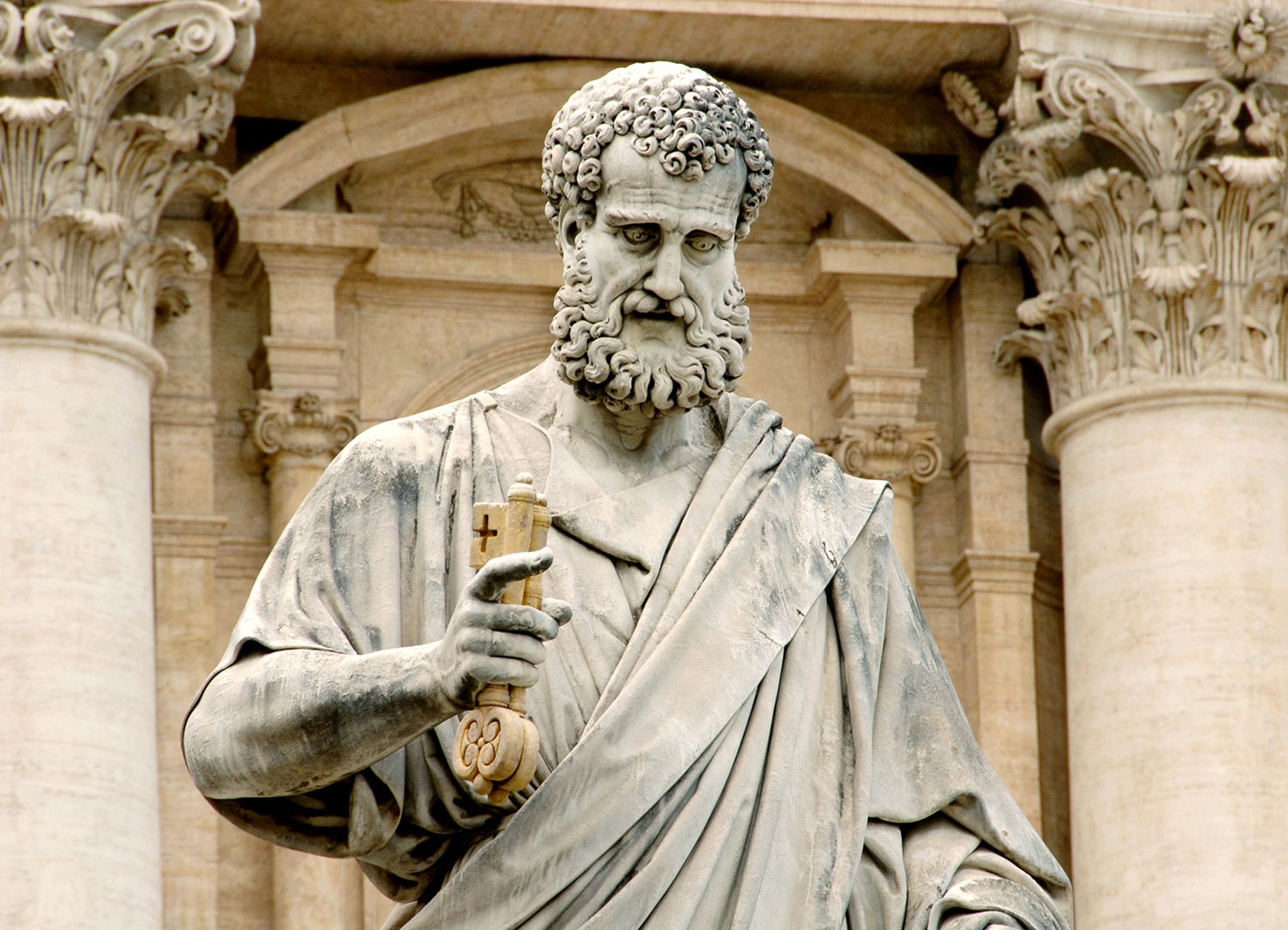The readings this Sunday belong to the sacred and mysterious charter deeds of Roman Catholicism, or, as the Catechism of the Catholic Church says, to the “Church’s very foundation” (No. 881). That is, they’re important because they tell immediately of a truth that remains even unto this day, not only for us as Catholics but in fact for all Christians. And that’s the truth about the papacy.
Eliakim, son of Hilkiah, is given the “key of the house of David” to serve as a sort of prime minister or chancellor for the king. What Eliakim opens is opened; what Eliakim shuts is shut (cf. Is 22:22). This is a biblical image of authority, an authority working often even into eternity. For instance, in Revelation 1:18, it’s the “one who lives” who holds the “keys to death and the netherworld.” In Matthew 23:13, Jesus denounces the Pharisees because they “lock the kingdom of heaven.” Eliakim bears a similar responsibility.
Now, there is, undoubtedly, much about this passage to interpret and debate. And much debate there has been and for a very long time. To cut to the chase: Eliakim is a type for Peter. Now Peter is given the keys; now he serves as steward of Son of David’s kingdom. But, of course, the Son of David is the Son of God; the keys given to Peter belong to the “kingdom of heaven.” What Peter opens is opened too; what Peter shuts is shut too (cf. Mt 16:19). But what’s opened or closed through Peter’s stewardship of the keys is not just any earthly kingdom but heaven itself. Peter at the pearly gates is an image not too far off the mark. Astounding as it sounds, Peter play’s a part in the unfolding of God’s kingdom. But what does that mean?
Well, it means a lot. For starters, in Luke when Jesus foretells Peter’s threefold denial, he tells Peter that after his failure, he’ll turn back to “strengthen” his brothers (Lk 22:32). That’s something that belongs to the Petrine vocation: strengthening the apostles. But he’s also, as the story from John makes clear, to “feed” and “tend” the sheep of Christ out of love for Christ (cf. Jn 21:15-19). This language is as related to governance as it is to pastoral care.
| August 27 – 21st Sunday in Ordinary Time |
|---|
|
Is 22:19-23 Ps 138:1-2, 2-3, 6, 8 Rom 11:33-36 Mt 16:13-20 |
We see these elements of Peter’s ministry throughout Acts of the Apostles as, for instance, when he preaches at Pentecost, praising God for the Spirit’s descent upon different nations (cf. Acts 2:14-36). We especially see them in Acts 10-11 where we watch Peter learn from his vision of all the “unclean animals,” and from his experience of Cornelius’ faith, that “God shows no partiality” (10:34). We see Peter defend his inclusive behavior, opening the faith to gentiles. Here we see Peter truly opening the doors of the Church, of heaven ultimately too. Of course, all of this is very brief, only a sketch. But at least in outline, we see here what Peter’s role is in the kingdom and in the Church. It’s unique; he’s the key bearer.
And, as I said, this is truth that remains, that bears immediately upon us today. Peter remains the key bearer even today. But how? The answer is in whom Peter’s keys are kept in trust. Joseph Ratzinger (Benedict XVI) talked about this, how the ministry of Peter endures through history always in a person serving, by God’s supernatural support, in Peter’s role. That is, Petrine ministry always functions within a person, the successor of Peter. The responsibility given to Peter in Matthew, which we see him exercise in Acts of the Apostles, is exercised in each generation by the Bishop of Rome.
To this, of course, an entire tradition bears witness, a tradition we haven’t space to discuss here. But it’s there, trust me. Explore it for yourself. As I said, it belongs to our charter deeds. Written atop St. Peter’s in Rome — Tu es Petrus et super hanc petram aedificabo ecclesiam meam — those words speak to what’s been true for centuries, what’s true today. And that is that Peter is still bearing the keys that were given him, and he’s still opening the doors of heaven for Christ. Because, of course, of his faith in Christ — the same faith we have.
Father Joshua J. Whitfield is pastor of St. Rita Catholic Community in Dallas and author of “The Crisis of Bad Preaching” (Ave Maria Press, $17.95) and other books.





